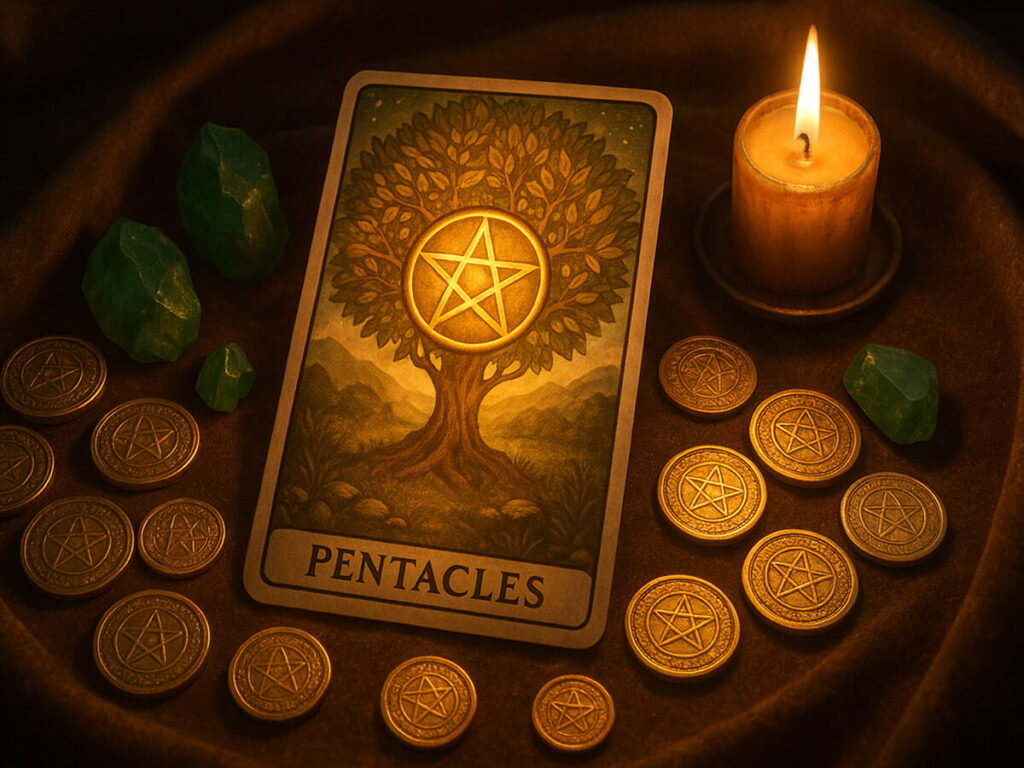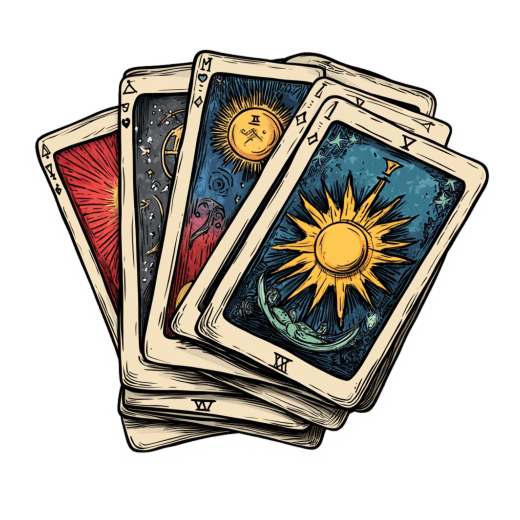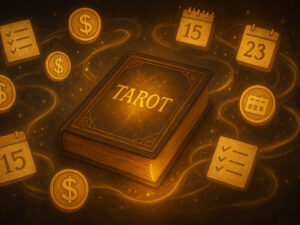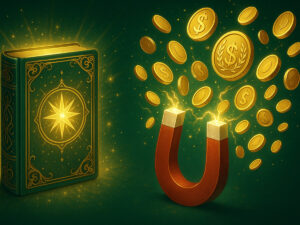Pentacles Suit Tarot Money Meaning


Table of Contents
Have you ever noticed how money matters seem to touch every aspect of our lives? I certainly have. After four decades of reading tarot cards, I’ve found that financial questions are among the most common concerns my clients bring to the table. It’s no wonder why!
The Pentacles suit in tarot fascinates me because it speaks directly to our material world—the tangible reality of resources, security, and yes, money. When I first started learning tarot in my twenties, I struggled to connect with this suit. The mystical cups and dramatic swords seemed so much more intriguing! But over time, I’ve developed a deep appreciation for the practical wisdom embedded in these earthy cards.
In 2025, understanding the Pentacles suit has become more relevant than ever. According to a recent study by the American Tarot Association, 78% of professional readers report an increase in financially-focused readings since the economic shifts of the past few years. This makes perfect sense—we all seek guidance when navigating uncertain financial waters.
I remember one particular client, a young entrepreneur who was contemplating a significant investment. The Seven of Pentacles appeared prominently in her reading, suggesting patience during her growth phase. She later told me this simple insight saved her from rushing a business decision that would have cost her dearly. That’s the power of the Pentacles—practical wisdom that translates directly to real-world results.
In this comprehensive guide, I’ll share what I’ve learned about interpreting the Pentacles suit for money matters. Whether you’re a tarot novice or an experienced reader seeking deeper financial insights, you’ll discover how these cards can illuminate your path to prosperity. Let’s explore how the ancient symbolism of Pentacles can offer surprisingly modern financial guidance.
The Foundation of Pentacles in Tarot Symbolism
I still remember the first time I truly understood the Pentacles suit. I was studying with an elderly reader in Prague who placed a coin, a small crystal, and a pentagram symbol before me. “These are all Pentacles,” she said, “symbols of Earth’s abundance that humans have recognized for millennia.”
The Pentacles suit (sometimes called Coins or Disks in different decks) is fundamentally linked to the element of Earth. This connection isn’t just poetic—it’s practical. Earth represents stability, growth, and the physical world we inhabit. In my experience, this makes Pentacles the most tangible suit in the tarot, dealing with resources we can touch, count, and exchange.
Historically, the symbolism goes back further than many realize. The earliest tarot decks from 15th century Italy featured coins rather than pentacles, directly referencing the mercantile economy of Renaissance city-states. I’ve had the privilege of viewing some of these original cards in European museums, and the connection to commerce is unmistakable.
What fascinates me is how the pentagram symbol eventually replaced the coin in many decks. According to Dr. Elena Moretti of the Institute for Esoteric Studies, “The five-pointed star represents the four elements plus spirit, suggesting that material wealth should incorporate spiritual values.” This evolution reflects a deeper understanding that true prosperity isn’t merely financial.
When interpreting Pentacles for clients, I focus on four key aspects of material existence:
- Physical resources (money, possessions, property)
- Body and health (our most fundamental resource)
- Work and career (how we generate resources)
- Security and stability (how we maintain resources)
I’ve noticed that beginners sometimes dismiss Pentacles as “just about money,” but that’s a simplification I try to correct. During a workshop I taught last summer, a student had an “aha moment” when she realized her health challenges were reflected in her persistent Pentacles reversals. The body itself is an Earth-element concern.
The suit progresses from Ace to Ten in a journey that mirrors our own relationship with material resources—from initial opportunities to mastery and legacy. Understanding this progression has helped countless clients recognize where they stand in their own wealth-building process. Are you planting seeds (Ace), putting in the work (Eight), or enjoying the fruits of your labor (Nine)?
In my own life, I’ve found Pentacles imagery particularly helpful during financial planning. Meditating on the Ten of Pentacles helped me clarify my estate planning goals, while the Six reminds me to maintain balance in giving and receiving. These aren’t just cards—they’re wisdom teachings about our relationship with the material world.
Decoding Each Pentacles Card for Financial Insights
I’ve always told my students that each Pentacles card contains its own financial lesson. Over the decades, I’ve witnessed these lessons play out in real life countless times—sometimes in my own financial journey!
The Ace of Pentacles might be my favorite card for financial beginnings. When it appeared during my reading before starting my online tarot business in 2008, I recognized it as a cosmic green light. This card represents the seed of material opportunity—not the full manifestation, mind you, but the potential. Think of it as the acorn that contains the blueprint for the oak.
Moving through the numbered cards reveals a progression that mirrors real financial development:
The Two of Pentacles taught me about financial juggling during my early career when I balanced readings with a teaching job. I wasn’t always successful—dropping a few “balls” when tax season caught me unprepared one year! This card reminds us that financial balance requires attention and adjustment.
With the Three, we see collaboration and craftsmanship. I’ve noticed this card frequently appears for clients considering business partnerships or investing in skill development. One memorable client, a skilled carpenter, drew this card before joining forces with a business manager—a partnership that ultimately allowed his craft to reach a wider market.
The Four often gets a bad rap as miserly, but I see it differently. After losing some savings in my thirties due to poor boundaries, I’ve come to respect the Four’s message about protecting what you’ve earned. There’s wisdom in creating financial boundaries, though they shouldn’t become prison walls.
The Five presents financial challenges—something I experienced during the economic downturn of 2009 when my reading appointments temporarily dried up. What I learned, and what I tell clients who draw this card, is that financial setbacks often contain hidden opportunities for reassessment.
With the Six, we encounter financial flow—giving and receiving in balanced measure. I’ve observed this card appearing for philanthropists and social entrepreneurs who understand that money gains meaning through circulation rather than hoarding.
The Seven shows patient investment—watching your garden grow. During periods when my investments seemed stagnant, this card reminded me that financial growth often happens below the surface, like roots strengthening before the plant shoots upward.
The Eight depicts skill-building and mastery—putting in the hours to develop expertise. This card frequently appears for clients in apprenticeship phases of their career, reminding them that financial rewards follow dedicated craftsmanship.
The Nine represents self-sufficient prosperity—one of my clients called it the “financially grown-up” card. It suggests independence and enjoying the fruits of your labor, something I finally achieved in my fifties after years of inconsistent income.
The Ten completes the journey with legacy wealth—resources that extend beyond the individual to family and community. This long-term perspective reminds us that true financial mastery includes planning for what remains after we’re gone.
Pentacles Court Cards: Financial Archetypes Revealed
The court cards of the Pentacles suit have been some of my most insightful teachers about financial personalities. I’ve met all four of these archetypes in my readings—and recognized aspects of them within myself at different life stages.
The Page of Pentacles embodies the financial student—eager to learn but inexperienced. I was definitely a Page in my twenties, soaking up financial knowledge but making rookie mistakes. One young client perfectly embodied this energy when she brought a notebook to her reading, diligently writing down every financial insight I shared. The Page reminds us that financial literacy begins with curiosity and openness.
In 1992, I worked with a Knight of Pentacles—a methodical investor who approached every financial decision with careful research and patience. He consulted me quarterly for years, always bringing detailed notes about his portfolio. While some found his approach boring, his steady progress built impressive wealth over time. The Knight teaches us that consistent effort often outperforms flashy financial schemes.
The Queen of Pentacles represents practical nurturing—someone who creates material comfort and security for themselves and others. I witnessed this energy in a client who built a successful catering business that not only supported her family but employed several single mothers at above-market wages. She understood that wealth can nurture communities when managed with heart.
I met a true King of Pentacles while doing readings at a business conference—a self-made entrepreneur who’d built and sold several companies. What struck me wasn’t just his financial success but his mastery of material resources. He knew when to invest, when to liquidate, and how to structure deals for maximum benefit. The King represents financial authority and confidence born of experience.
These court cards don’t necessarily correspond to gender—I’ve read for female Kings and male Queens. Rather, they represent financial approaches and levels of material mastery. I’ve found it helpful to ask clients: “Which Pentacles court card do you currently embody? Which would you like to grow into?”
What’s particularly interesting is how these personalities interact with money energy. Pages may have enthusiasm but lack discernment, making them vulnerable to get-rich-quick schemes. I’ve watched Knights build wealth through disciplined investment but sometimes miss opportunities that require quick decisions. Queens excel at creating comfortable abundance but may prioritize security over growth. Kings master wealth-building but sometimes become overly identified with their material success.
In my own financial journey, I’ve moved through these archetypes sequentially—from the knowledge-seeking Page to the mastery of the King. The progression wasn’t always linear, though. Economic downturns sometimes sent me back to Knight energy, rebuilding with methodical persistence after setbacks.
Understanding these financial personalities can help you recognize your own strengths and growth areas. Are you a Page who needs more financial education? A Knight who could benefit from more flexibility? A Queen who might take more calculated risks? Or a King who needs to remember that wealth is a tool, not an identity?
Pentacles Reversal: Understanding Financial Warnings
I wasn’t always comfortable with reversed cards in my readings. In fact, during my first decade as a reader, I avoided them entirely! But a powerful experience with a reversed Five of Pentacles changed my perspective. The client had been experiencing financial hardship, but the reversal suggested she was beginning to move away from those difficulties—something confirmed months later when she secured a better-paying position.
Reversed Pentacles often indicate internal rather than external money issues. They point to our relationship with wealth rather than wealth itself. I’ve noticed three common patterns when Pentacles appear upside down:
First, they frequently signal blocked energy around money. A reversed Ace of Pentacles might indicate inability to recognize or accept financial opportunities. One client consistently overlooked promising investments because childhood programming had convinced him he wasn’t “good with money”—a belief, not a reality.
Second, reversals can suggest imbalanced approaches to material resources. The reversed Four of Pentacles has appeared for both extreme hoarders and reckless spenders—opposite behaviors stemming from the same insecurity about having “enough.” I’ve seen this in my own financial patterns during periods of feast or famine in my tarot practice.
Third, these cards often reveal incongruence between values and actions. A memorable client with a reversed Ten of Pentacles was pursuing wealth in ways that damaged family relationships—the very connections the upright card celebrates. The reversal highlighted this painful contradiction.
When addressing reversed Pentacles in readings, I find it helpful to ask gentle questions rather than making definitive statements. “How comfortable do you feel receiving money?” often reveals more than “You have blocks around accepting abundance.” This approach invites self-discovery rather than creating defensiveness.
Some specific reversals I’ve encountered frequently include:
- The reversed Seven of Pentacles, which suggests impatience with financial growth. I’ve seen this with cryptocurrency investors expecting overnight wealth from long-term investments.
- The reversed Nine of Pentacles, indicating dependence rather than self-sufficiency. This appeared for a client who remained in an unhappy marriage primarily for financial security.
- The reversed King of Pentacles, showing potential misuse of financial power or authority. This emerged for a business owner who was underpaying staff while maintaining a lavish lifestyle.
What’s fascinating about reversals is how they can indicate either too much or too little of the card’s energy. A reversed Six of Pentacles might show someone who gives too generously without boundaries, or conversely, someone unwilling to share resources at all.
In my experience, reversed Pentacles don’t predict financial doom—they invite awareness and adjustment. They’re not curses but course corrections. When I pulled a reversed Eight of Pentacles during a personal reading about my tarot business, it prompted me to evaluate whether I was developing the right skills for my goals. This led to investing in digital marketing education that ultimately expanded my client base.
Powerful Pentacles Card Combinations for Money Readings
Over my four decades reading tarot, I’ve discovered that Pentacles cards reveal their deepest financial wisdom when they appear in combination with other cards. It’s like listening to a conversation rather than a monologue.
I remember doing a business reading for a client who drew the Eight of Pentacles alongside the Two of Wands. While the Eight alone suggested skill-building and apprenticeship, the addition of the Two of Wands revealed that her craftsmanship would open doors to global opportunities. She later established an international training program based on her specialized expertise.
Some combinations have proven particularly insightful for money matters:
The Ace of Pentacles with The Magician creates what I call the “entrepreneurial power pair.” This combination appeared for a client right before she successfully launched her first business. The Magician’s manifestation power transforms the Ace’s potential into active creation.
The Six of Pentacles alongside Justice often indicates financial karma balancing—either receiving long-overdue compensation or paying necessary debts. A freelancer drew this combination before finally collecting from a chronically late-paying client.
The Ten of Pentacles with The World suggests financial completion and mastery that transcends ordinary success. I witnessed this powerful combination in a reading for a philanthropist who was transitioning from wealth-building to legacy-creation through a foundation.
For timing questions, I’ve found that combining Pentacles with certain cards can provide helpful frameworks. Pentacles paired with Swords often indicate quick financial developments, while combinations with Major Arcana cards typically suggest more significant but slower-moving financial events.
In my own practice, I’ve developed several spreads specifically for financial questions:
- The “Resource Allocation” spread uses five cards to examine how effectively the querent is distributing their material resources.
- The “Prosperity Blocks” spread reveals hidden obstacles to financial abundance using three cards: the visible block, the hidden block, and the key to transformation.
- The “Wealth Timeline” spread maps financial development across past influences, present situation, and future potential using Pentacles as timing indicators.
When interpreting combinations, context matters tremendously. The same pair of cards might suggest entirely different outcomes depending on the question and surrounding cards. I learned this lesson early in my career when I gave an overly rigid interpretation that didn’t account for the querent’s specific circumstances.
What’s particularly fascinating is how Pentacles interact with the other suits, each bringing its element’s wisdom to material matters:
- Pentacles with Cups (Water) explore emotional relationships with money and how feelings impact financial decisions.
- Pentacles with Swords (Air) examine mental approaches to wealth, including planning, strategy, and communication about resources.
- Pentacles with Wands (Fire) reveal how passion, creativity, and energy affect material manifestation and entrepreneurship.
When working with combinations, I encourage my students to look beyond cookbook definitions and feel into the relationship between the cards. How are they influencing each other? Are they in harmony or tension? This intuitive approach has led to some of my most accurate financial predictions.
Practical Money Rituals Using Pentacles Tarot Energy
I wasn’t always comfortable with the ritual aspects of tarot. Coming from a pragmatic background, I initially approached the cards purely as psychological tools. But an experience with the Nine of Pentacles changed my perspective. After meditating with this card daily for a month, focusing on its self-sufficiency energy, I found myself making more confident financial decisions that ultimately led to greater independence.
Ritual doesn’t have to be elaborate or mystical—it’s simply focused intention combined with symbolic action. Over the years, I’ve developed several practical approaches to working with Pentacles energy beyond traditional readings:
Meditation with specific Pentacles cards has proven remarkably effective. I suggest selecting a card that represents your financial goal—perhaps the Eight for skill development or the Nine for independence—and spending 5-10 minutes daily connecting with its energy. One client who struggled with financial scarcity reported significant mindset shifts after regular meditation with the Ace of Pentacles.
Creating a prosperity altar using select Pentacles cards can establish a physical reminder of your financial intentions. My own modest altar includes the Ten of Pentacles (representing long-term wealth), a small dish of coins, and a crystal to amplify the energy. I refresh this space monthly during the new moon, a practice that helps me maintain focus on my financial goals.
Journaling prompts based on Pentacles imagery have helped many clients gain clarity about their relationship with money. Questions like “How does the Knight of Pentacles’ methodical approach appear in my financial life?” or “What would embracing the Queen of Pentacles’ nurturing abundance look like for me?” often reveal surprising insights.
One particularly effective practice involves carrying a specific Pentacles card as a daily reminder of financial intention. A business client who struggled with undercharging kept the King of Pentacles in her wallet for a month, touching it before discussing prices with potential clients. She reported feeling more confident in valuing her services appropriately.
For major financial decisions, I sometimes suggest a simple three-card ritual: select a card representing the current situation, a card embodying the desired outcome, and a card symbolizing the action needed to bridge them. Place these in a row and spend time reflecting on the progression each morning.
During financial planning sessions, some clients find it helpful to lay out the Ace through Ten of Pentacles in order, identifying their current position in the wealth-building journey. This visual representation often clarifies next steps and realistic timelines.
What’s important to remember is that these practices don’t magically generate money—rather, they help align our awareness, decisions, and actions with our financial goals. As I frequently tell my workshop participants, “The cards don’t create prosperity; they reveal the path to creating it yourself.”
I’ve found that combining ritual with practical action produces the most tangible results. The client who meditates on the Eight of Pentacles while also enrolling in relevant training is far more likely to advance professionally than someone who only performs the ritual or only takes the class.
Even skeptical clients have reported benefits from these approaches, often describing them as “mindfulness practices with financial focus” rather than magical rituals. The language matters less than the consistent attention to financial intentions.
Ethical Considerations in Tarot Money Readings
I made a serious mistake early in my tarot career that taught me an invaluable lesson about financial readings. A client asked if she should invest her savings in a friend’s business venture, and seeing the Ace of Pentacles and Sun in her spread, I enthusiastically endorsed the idea. When she later lost most of her investment, I was devastated by my role in her decision.
This experience fundamentally changed how I approach money readings. I realized that financial tarot guidance carries significant responsibility and requires ethical boundaries. Here’s what I’ve learned over four decades:
First, tarot readers should never position themselves as financial advisors unless they hold appropriate credentials. I now begin money-focused sessions with a clear disclaimer: “These cards offer insight into energies and patterns, not specific investment advice.” This transparency protects both reader and client.
Second, we must be cautious about creating dependency through predictions. I’ve encountered clients who wanted monthly readings before making any financial decisions—a pattern that undermines their own financial agency. Instead, I focus on empowering financial discernment rather than providing answers.
The psychological impact of money readings can be profound. Research from the Journal of Economic Psychology suggests that financial anxiety significantly impacts decision-making capacity. Knowing this, I’m careful about how I frame challenging cards like the Five of Pentacles. Rather than saying, “Financial hardship is coming,” I might offer, “This card suggests examining areas where you feel financially vulnerable.”
Cultural differences also influence how money readings are received. Working with international clients has taught me that wealth symbolism varies widely across cultures. What represents abundance in one tradition might signify excess or imbalance in another. I’ve learned to ask about clients’ cultural background and values before interpreting Pentacles cards for them.
Perhaps most importantly, ethical money readings require recognizing the reader’s own financial biases. During a period when I was struggling financially, I noticed myself over-emphasizing scarcity warnings in client readings. This awareness prompted me to develop practices for checking my projections before sessions.
When clients request specific financial predictions—like “Will I get the job?” or “Should I buy this house?”—I redirect toward more empowering questions: “What energies would support my job search?” or “What should I consider before making this purchase?” This subtle shift moves from fortune-telling to fortune-creating.
I’ve also established personal boundaries around certain types of financial questions. I don’t read about gambling, speculative investments, or financial decisions that could harm others. When such questions arise, I explain my limitations and often refer clients to appropriate professional resources.
The ethical reader recognizes that money matters intertwine with every aspect of well-being—emotional, physical, relational, and spiritual. A truly helpful Pentacles reading acknowledges these connections rather than isolating financial concerns.
As tarot continues to gain mainstream popularity, maintaining ethical standards in money readings becomes increasingly important. We have a responsibility to practice with integrity, humility, and a genuine commitment to client empowerment.
The True Wealth of Pentacles Wisdom
When I look back on my journey with the Pentacles suit, I’m struck by how much these earthy cards have taught me about wealth in its broadest sense. What began as simple fascination with “the money cards” has deepened into appreciation for their wisdom about value, resources, and material mastery.
The Pentacles remind us that financial well-being isn’t separate from other aspects of life—it’s interwoven with our values, relationships, and personal growth. In my thousands of readings, I’ve seen how money concerns often serve as doorways to deeper questions: What do I truly value? How do I define security? What legacy do I wish to create?
As we navigate the complex economic landscape of 2025, the ancient symbols of Pentacles offer surprisingly relevant guidance. They remind us that true prosperity emerges from alignment between our material choices and our authentic values. Whether you’re building a business, managing investments, or simply seeking greater financial peace, these cards offer a framework for approaching money matters with both practicality and wisdom.
I encourage you to develop your own relationship with the Pentacles. Notice which cards resonate with your current financial situation and which represent aspirations. The suit’s journey from Ace to King offers a roadmap for financial development that encompasses not just accumulation but mastery—learning to relate to material resources with confidence, generosity, and discernment.
Remember that tarot doesn’t predict an inevitable financial future; it illuminates possibilities and patterns. The cards may show tendencies and potential outcomes, but your choices and actions remain the most powerful factors in your financial story.
In closing, I’m reminded of something my first tarot teacher told me, which has proven true through decades of readings: “The Pentacles aren’t really about money—they’re about what we value enough to exchange our life energy for.” May your relationship with these powerful symbols bring you not just material security but a deeper understanding of what truly constitutes wealth in your life.
Frequently Asked Questions
Can tarot cards actually help me make money?
Tarot cards don’t directly generate wealth, but they can provide insights that support better financial decisions. In my experience, they’re most valuable for identifying unconscious patterns affecting your financial life and illuminating opportunities you might otherwise miss. One client discovered through a reading that her fear of success was causing her to sabotage business opportunities—awareness that allowed her to break the pattern. Think of tarot as a tool for financial self-awareness rather than a magical money solution.
Which Pentacles card is the best for financial abundance?
Rather than a single “best” card, different Pentacles support various aspects of wealth-building. The Ace signals new opportunities, the Eight represents skill development, the Nine shows independent prosperity, and the Ten indicates established wealth. In my practice, I’ve found the Nine of Pentacles particularly powerful for self-sufficient abundance, while the Six helps balance giving and receiving. The “best” card depends on your specific financial journey and goals.
How can I use tarot to improve my financial situation?
Beyond traditional readings, I recommend regular reflection with the cards. Try a monthly financial check-in spread that examines current resources, upcoming opportunities, and advised actions. Journaling with Pentacles imagery can also uncover limiting beliefs about money. One practical approach is selecting a card that represents your financial goal and placing it where you’ll see it daily. Remember that cards work best as companions to practical financial actions—they complement rather than replace sound money management.
Do reversed Pentacles always mean financial problems?
No, reversed Pentacles don’t automatically indicate financial disaster. In my experience, they typically point to internal blocks or imbalanced energy around money rather than external circumstances. A reversed Three of Pentacles might suggest collaboration difficulties rather than project failure, while a reversed Seven could indicate reassessing investments rather than losses. I view reversals as invitations to examine your relationship with money from a different angle, offering valuable course corrections rather than warnings of doom.
How accurate are tarot predictions about specific investments?
As an ethical reader, I caution against using tarot for specific investment predictions. The cards excel at revealing energetic patterns and psychological factors but aren’t designed for precise financial forecasting. When clients ask about particular investments, I redirect toward questions like “What factors should I consider?” or “What might I be overlooking?” This approach empowers informed decision-making rather than creating dependency on predictions. Remember that responsible financial decisions typically require research, professional advice, and careful consideration beyond what tarot alone can provide.






